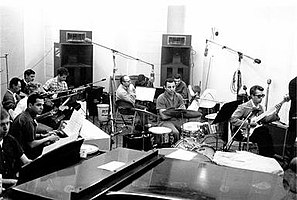The Wrecking Crew (music)
| The Wrecking Crew | |
|---|---|

Members of the Wrecking Crew employed for a session at Gold Star Studios in the 1960s. Seated left to right: Don Randi, Al De Lory, Carol Kaye, Bill Pitman, Tommy Tedesco, Irving Rubins, Roy Caton, Jay Migliori, Hal Blaine, Steve Douglas, and Ray Pohlman.
|
|
| Background information | |
| Also known as |
|
| Origin | Los Angeles, California |
| Genres | Pop, rock, R&B |
| Years active | 1960s–1970s |
| Past members | See below |
The Wrecking Crew (sometimes called the Clique or the First Call Gang, occasionally credited as the Phil Spector Wall of Sound Orchestra) was a loose-knit circle of Los Angeles' top studio session musicians whose services were constantly in demand during their heyday in the 1960s and early 1970s. Usually playing collectively in varying configurations, often anonymously, they backed dozens of popular acts on numerous top-selling hits of the era. They are now widely considered one of the most successful session recording units in music history.
The group's ranks began to materialize in the late 1950s, but in the early 1960s they fully coalesced into what became their most recognizable form when they became the de facto house band for Phil Spector, playing on many of the hits that he produced at the time, and contributing to the development of his Wall of Sound production methods. After the initial success of Spector's records, they became the most requested session musicians in Los Angeles, playing behind many popular recording artists such as Jan & Dean, Sonny & Cher, Barry McGuire, the Mamas & the Papas, Frank Sinatra, and Nancy Sinatra. They were sometimes used as "ghost players" on recordings credited to rock groups, such as the Byrds' debut hit rendition of Bob Dylan's "Mr. Tambourine Man" (1965), as well as the first two albums by the Monkees, and the Beach Boys' Pet Sounds (1966).
Though they had no official moniker during their active years, the nickname "the Wrecking Crew" was later popularized by drummer and member Hal Blaine in his 1990 memoir, in which he attributed the origin of the term to disparaging comments made about them in the early 1960s by older musicians who were critical of their embrace of rock & roll. The Wrecking Crew's contributions on so many hit recordings of the era went largely unnoticed until the publication of Blaine's memoir and the subsequent attention that followed.
...
Wikipedia
